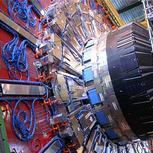On Feb. 20, the Large Hadron Collider (LHC) will recommence operations after undergoing repairs. The fifth hadron collider in the world, it is located at the European Organization for Nuclear Research (CERN) in Switzerland. “The Large Hadron Collider has one simple but audacious aim,” said CERN physicist Brian Cox on the Discovery Channel’s “The Big Bang Machine,” “to recreate the conditions of The Big Bang in an attempt to answer the most profound questions of our universe.”
Smashing protons into each other at near light speed within its 17 mile long circular tunnel, the LHC contains four massive particle detectors that photograph the particles as they collide, break apart and recombine. According to the New York Times, each proton requires up to seven-trillion electron volts in order to reach the appropriate speed.
From these experiments, physicists hope to find the Higgs boson particle in order to prove the Higgs Field theory. Named after English theoretical physicist Peter Higgs, this theory explains how matter attains mass. If proven, it could shed significant light on how subatomic particles colliding in the Big Bang led to the formation of the greater universe.
“By far their most challenging quarry has been the Higgs, the last missing piece of the standard model of particle physics, thought to give mass to its fellow particles by acting sort of like a molasses through which they all have to plow,” said JR Minkel in a 2008 article in Scientific American. “If the Higgs exists, everyone is confident that the LHC will find it.”
“The Higgs brings simplicity and beauty to a nature which looks too complicated,” said Dr. Leon Lederman on “The Big Bang Machine.” “It introduces a kind of symmetry and a kind of beauty to nature which gives us an understanding of one of the most puzzling features of (the Standard Model).”
The Higgs boson is theoretically so massive that it will decay into lighter particles almost instantly. Therefore, finding the Higgs boson requires finding its decay.
However, because creating a high mass particle like the Higgs could statistically produce a black hole in the wake of its decay, the LHC has garnered some concern both inside and outside of the scientific community.
“There is a minute possibility that they could create a big enough mass in a small enough space that it could become a black hole, but on the same level, there is a minute possibility that when you sit in a chair, the atoms in your body will go through the atoms in that chair and you’ll fall through,” said Assistant Professor of Physics Don Smith.
“The probability that you would go right through is not zero, it’s just so small that it never comes up,” Smith added.
CERN addressed the black hole fear by creating a risk assessment. According to CERN physicists, the fear is misplaced, and the LHC is necessary.
“If you’re going to go for the big questions, then you have to go for it,” CERN Professor John Ellis said on “The Big Bang Machine.” “There’s no sense in messing around. If you really want to understand how the universe ticks, then the LHC is what you need.

